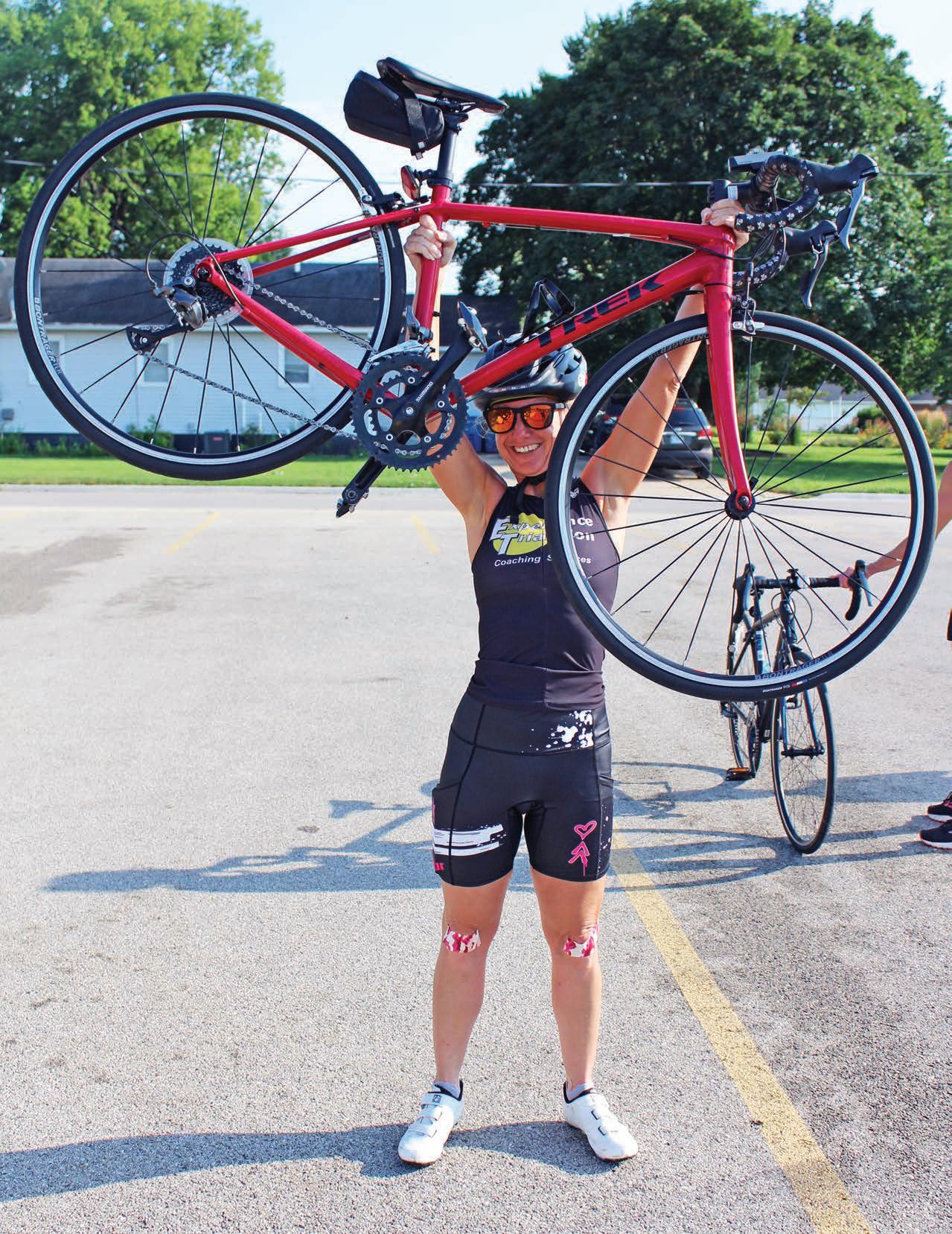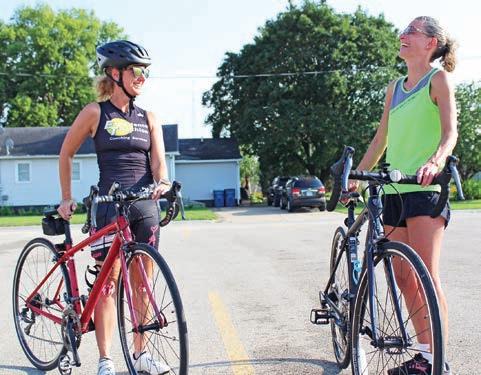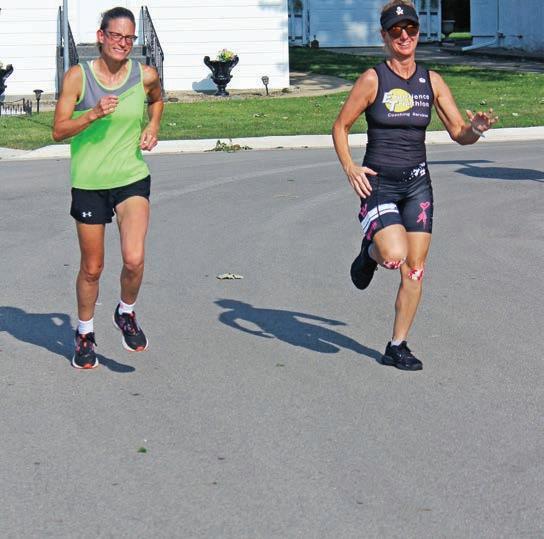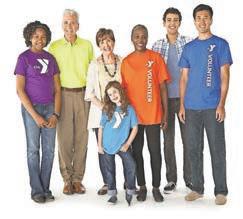
7 minute read
A Triple Threat
from BCR_IV Living_091821
by Shaw Media
Competing in triathlons gives Rebecca Amble of Peru a sense of accomplishment and confidence in herself.

Rebecca Amble (left) and Christa Easi (right) both say that having a mentor or coach can make a big difference when competing in your first triathlon. They can help you come up with a strategy and stay motivated.
Peru woman competes in triathlons
Story and photos by Shannon Serpette
Those who knew Rebecca Amble of Peru when she was younger would think she was the unlikeliest person to someday begin competing in triathlons.
“I was never an athlete at all. I hated gym class. I was a lazy kid,” she said. “I’m not coordinated. I’m not good at aerobics.”
Although she paints a pretty bleak picture of her athletic prowess, she has managed to turn it around – and it all began after she decided to start running.
“I started running in 2012,” Amble, who is now 43, said. “I was actually wanting to lose some weight after I had my twins.”
After her first 5k race, she was hooked and later joined the Starved Rock Runners, a welcoming group full of knowledgeable runners. She knew joining would give her valuable information about running and some extra motivation, but she also made many friends.
“You want to be there for the camaraderie,” she said.
After several years of running, Amble decided to up the ante by completing a duathlon, a run/bike/run course.
See Triathlon page 14
Where to Practice for a Triathlon in Bureau County
You can’t fake your way through a triathlon. Either you’ve done the training, or you haven’t. And if you haven’t, you’ll get a hard reality check when the race starts. If you live in the Illinois Valley, you have training options. In LaSalle County, would-be triathletes can stop by the Illinois Valley YMCA after or before work to hit the swimming pool or the machines. In Bureau County, the one-stop place for triathlon training is the Bureau County Metro Center in Princeton. “The Bureau County Metro Center has so much to offer,” Nick Davis, assistant director and superintendent of recreation for Princeton Park District/Bureau County Metro Center said. “You can train for all three aspects of a triathlon in one facility.” “We have a cardio room full of treadmills and bikes – recumbent and upright. We offer spin classes, a running clinic, and Boot Camp classes for your cross-training workouts,” Davis added. “We have a six-lane 25-yard pool where you can work on your swimming skills, drills, and techniques. Additionally, we have all kinds of other cardio equipment, a loaded weight room, a functional training room, and all kinds of group exercise classes.”
Top Tips for Training for a First Triathlon

Thinking about trying to tackle a triathlon? Rebecca Amble of Peru has completed triathlons and is now working her way up to an Olympic-sized race. For people looking for a challenge, she offered some tips you should know before competing in your first triathlon.
1. Find a mentor, coach, or partner with experience in
triathlons: It can be intimidating to go into your first triathlon flying solo. It’s better to have a mentor to guide you along your way, Amble said. That way, you’ll avoid rookie mistakes and understand the process a little better. “And then you learn when you get there,” she said. 2. Practice in open water: It’s fine to work on your form, technique, and time by swimming at your local swimming pool. But you should also include some swimming in a lake if you can and buy a wetsuit to stay warm. While many swimmers think it’s a good idea to turn their head while swimming as they would while doing laps in a pool, her coach told her not to do that. “Swim like a crocodile,” Amble said, adding that you should keep looking straight ahead. “The less rotation in your neck, the better off you’ll be.” 3. Get a good bike: Your bike can help you or hurt you. For her first triathlon, Amble showed up with her mountain bike, which is harder to pedal than the bikes usually used for triathlons. After that race, she bought a proper triathlon bike, and it’s been easier ever since. 4. Inspect your bike before the race: You don’t want your hard work to be sabotaged by a bike breakdown in the middle of your triathlon. Have your bike inspected before you head to the race or by the experts who are often helping at the race before it starts, she said. 5. Save your strength for the run: The swimming should be looked at as the warm-up during the race, Amble said. From there, you should take it easy on the bike to save your legs for the run.
FREE2-weektrial membership
Withthiscoupon.Expires10/31/2021
JoinerFees Waived fornewmembers!

300 WalnutSt, Peru 815-223-7904 1811S13th Ave,Mendota 815-538-2900 www.ivymca.com ota
Triathlon
FROM PAGE 13
“I had so much fun,” she said. “I decided to challenge myself to participate in a triathlon sprint.”
To finish, she would have to swim 400 meters, bike 13 miles, and run a 5k, which is 3.1 miles. Like many who compete in triathlons, swimming was the portion that Amble found most intimidating while training. When you’re running and get tired, you can start walking, and when you’re biking and get tired, you can slow down, she said. But when you’re in the water swimming, you have to keep going, even if you’re tired.
“I hired a coach because I had no idea how to swim. Swimming is the most difficult sport for me, especially if it’s in open water. It was a lot scarier than I expected and very easy to swim off course,” she said.
After completing her first triathlon in 2017, she liked it so much that she decided to continue competing. This year, she plans to attend a triathlon camp in Madison, Wisconsin and had three triathlons scheduled for August 2021.
“My long-term goal is to work up to an Olympic-distance triathlon -- .93-mile swim, 24-mile bike ride, 6.2-mile run,” she said. “I have been training by running with the Starved Rock Runners and participating in 5k races in the area. I’ve also been cycling with the Starved Rock Cycling Club. We ride various distances throughout the week.”
Having friends who do the training with you can make a lot of difference while trying to find the motivation to stay on course.
“I’ve also had the fortune of having my running buddy Christa Easi to train with. She is doing her first tri this year,” she said.
Amble met Easi through the Starved Rock Runners group.
“She was my competition,” Amble said, explaining that she was often in the same local races and age categories as Easi.
Amble continues to thrive from the fellowship she gets from Starved Rock Runners. Even the faster runners are extremely encouraging to new runners or those who aren’t quite as fast. Mary Beth Potthoff of Peru is another member of the Starved Rock Runners who occasionally runs with Easi and Amble. Both women call her an inspiration to other runners.
“I’m just someone who likes to run with other women,” Potthoff said.
New runners can gain all kinds of valuable insight from the experienced runners of the club, so Amble highly recommends that anyone interested in competing in triathlons join the Starved Rock Runners. Easi agrees with that advice, saying the group has been a tremendous resource for her. She completed her first triathlon in 2021.
“I had never done one before,” Easi said. “I wanted to try one.”
Easi offers this advice to people who are up for the challenge of trying their first triathlon but are nervous: “Don’t be afraid. Just do it. It’s nerve-racking but fun.”
As for Amble, while the Olympic-sized triathlon is next on her list, she has her eyes on a bigger race. Amble’s dream goal is to do a Half Ironman competition, which involves doing a 1.2-mile swim, 56-mile bike ride, and a 13.1 mile run.
And that weight she was trying to lose? It’s gone now. She has dropped 20 pounds since first lacing up her running shoes. But even more important than what she lost is what she has gained – she’s stronger, more confident, and ready to face challenges head-on.


